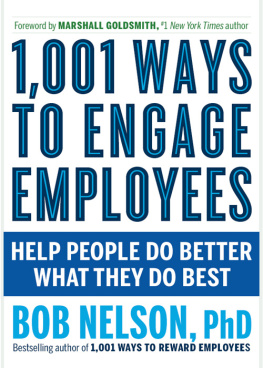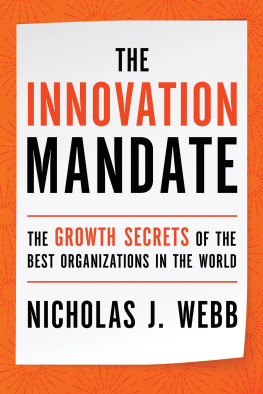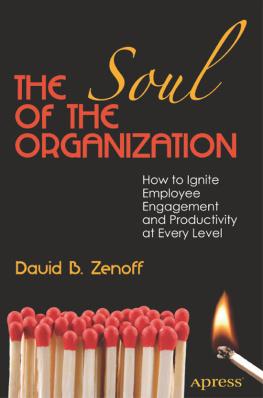More Praise for The Idea-Driven Organization
The Idea-Driven Organization is an exciting book that makes a compelling case for a simple but very powerful conceptbusiness leaders who learn how to leverage the know-how and ideas of their frontline people will have a major winning edge because most of their competitors either dont get it or dont know how to do it. The detailed and provocative case examples are a major strength of the bookthey show how business leaders can put ideas into action by tapping the expertise in their own organization.
Lee Bolman, coauthor of Reframing Organizations
Were at the end of the age of being able to do more with less based on tired old management models and thinking. To thrive in the new era, organizations will need to be idea driven. Fortunately, Robinson and Schroeder have written a must-read guide for leaders looking to make this transformation.
Chip R. Bell, coauthor of Managing Knock Your Socks Off Service and Managers as Mentors
The Idea-Driven Organization is a challenge to the dominant paradigm of Manager Knows Best, replacing it with a more balanced program of top-directed but bottom-driven initiative to keep creativity and productivity flowing. It is no less than a call for a complete housecleaningfrom physical and spatial relationships, to organization and information flows, and to changing the mindsets of employees and management alike! Required reading in an increasingly globalized and competitive world.
Dean Cycon, founder and CEO, Deans Beans Organic Coffee Company, and winner of a 2013 Oslo Business for Peace Award and the United Nations Womens Empowerment Principles Leadership Award for Community Engagement
Robinson and Schroeder have learned from experience the power of people at the front line of the organization actively identifying and solving problems. Building on their previous book, Ideas Are Free, they tell us how to create an environment to encourage the free flow of ideas to become a high performing organization.
Jeffrey K. Liker, PhD, Professor, University of Michigan, and author of The Toyota Way
To succeed in business today, it is absolutely essential that you tap into the ideas, creativity, and innovation of every member of your team. Working with companies around the world, I have seen that one of the greatest roadblocks to their success is a failure to truly get the most possible value from their talent. I am extremely impressed with this book and have recommended it to many of my clients. The authors lay out a superb blueprint, with lots of tools and examples, for creating an idea-driven organization. This is one of those rare must-read books.
John Spence, author of Awesomely Simple
The
Idea-Driven
ORGANIZATION
UNLOCKING THE POWER
IN BOTTOM-UP IDEAS
The
Idea-Driven
ORGANIZATION
Alan G. Robinson
Dean M. Schroeder

The Idea-Driven Organization
Copyright 2014 by Alan G. Robinson and Dean M. Schroeder
All rights reserved. No part of this publication may be reproduced, distributed, or transmitted in any form or by any means, including photocopying, recording, or other electronic or mechanical methods, without the prior written permission of the publisher, except in the case of brief quotations embodied in critical reviews and certain other noncommercial uses permitted by copyright law. For permission requests, write to the publisher, addressed Attention: Permissions Coordinator, at the address below.

| Berrett-Koehler Publishers, Inc.
235 Montgomery Street, Suite 650
San Francisco, California 94104-2916
Tel: (415) 288-0260, Fax: (415) 362-2512
www.bkconnection.com |
Ordering information for print editions
Quantity sales. Special discounts are available on quantity purchases by corporations, associations, and others. For details, contact the Special Sales Department at the Berrett-Koehler address above.
Individual sales. Berrett-Koehler publications are available through most bookstores. They can also be ordered directly from Berrett-Koehler: Tel: (800) 929-2929; Fax: (802) 864-7626; www.bkconnection.com
Orders for college textbook/course adoption use. Please contact Berrett-Koehler: Tel: (800) 929-2929; Fax: (802) 864-7626.
Orders by U.S. trade bookstores and wholesalers. Please contact Ingram Publisher Services, Tel: (800) 509-4887; Fax: (800) 838-1149; E-mail:
Ordering for details about electronic ordering.
Berrett-Koehler and the BK logo are registered trademarks of Berrett-Koehler Publishers, Inc.
First Edition
Hardcover print edition ISBN 978-1-62656-123-6
PDF e-book ISBN 978-1-62656-124-3
IDPF e-book ISBN 978-1-62656-125-0
2014-1
Production Management: Michael Bass Associates
Cover Design: Ian Shimkoviak/The Book Designers
To Margaret, Phoebe, and Margot
To Kate, Lexie,
Liz, and Tori
CONTENTS
PREFACE
AFTER YEARS OF BEING ASKED to do more with less, managers are increasingly aware that they cannot produce the results that are expected of them with the organizations they currently have and the methods they currently use.
We have now been doing more with less for so long that we have reached a point where further demands can no longer be met by simply tweaking our existing organizations or management methods. Cutting wages, perks, and benefits and pushing people to work harder can go only so far. A different approach is needed. Interestingly, the best solution involves the very people that have been bearing the brunt of the cost so far: ordinary employees.
Every day, front-line employees see many problems and opportunities that their managers do not. They have plenty of ideas to improve productivity and customer service, to offer new or better products or services, or to enhance their organizations in other ways. But their organizations usually do better at suppressing these ideas than promoting them.
In our experience, most managers have difficulty believing that there is enough value in employee ideas to justify the effort of going after them. But as we shall explain, some 80 percent of an organizations potential for improvement lies in front-line ideas. This fact means that organizations that are not set up to listen to and act on front-line ideas are using at best only a fifth of their improvement engines. And much of their innovation potential is locked up in the same way. When managers gain the ability to implement twenty, fifty, or even a hundred ideas per person per year, everything changes.
Today, a growing number of idea-driven organizations have become very good at promoting front-line ideas and as a result are reaching extraordinary levels of performance. Whereas traditional organizations are directed and driven from the top, idea-driven organizations are directed from the top but are driven by ideas from the bottom.
A number of years ago, we wrote Ideas Are Free, in which we articulated and documented what becomes possible when an organization aggressively pursues front-line ideas. We described companies with the best idea systems in the world and the extraordinary advantages these systems provide. This vision attracted numerous leaders and managers around the world. Some ran with it and were quite successful. But others struggled. We began to get a lot of calls for help.
Next page







